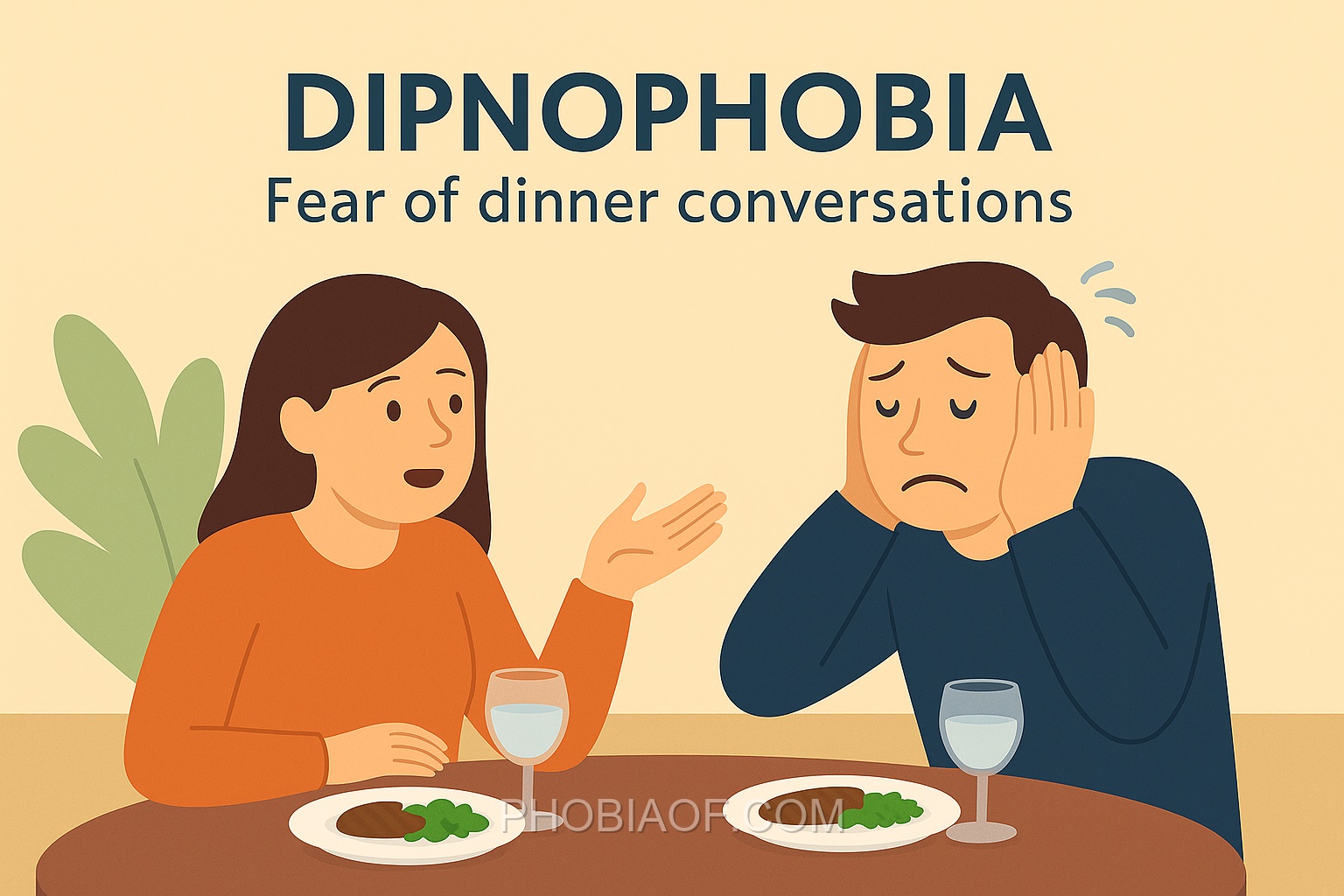Have you ever felt a wave of anxiety wash over you at the thought of sitting down for a meal with others, dreading the small talk that often accompanies dinner settings? If so, you might be familiar with Dipnophobia, a specific type of social anxiety characterized by the fear of dinner conversations.
Dipnophobia combines the Greek word “dipno,” meaning “dinner,” with “phobia,” which signifies “fear.” This condition manifests as an overwhelming sense of dread or discomfort in settings where one is expected to engage in conversation over a meal. For some, this can turn a simple dinner invitation into a source of significant stress and anxiety.
This fear can affect individuals in various ways. Some might avoid social gatherings altogether, missing out on important social and familial connections, while others might experience physical symptoms such as sweating, shaking, or an elevated heart rate during these interactions. MyInfoConnect highlights that for many, the pressure to maintain engaging conversation or fear of awkward silences can be paralyzing, leading to a cycle of avoidance that can impact one’s social life and mental well-being.
Understanding and acknowledging Dipnophobia is the first step towards managing it. With the right support and strategies, individuals can learn to navigate these social settings with greater ease and confidence.
Causes of Dipnophobia
Dipnophobia, the fear of dining or dinner conversations, can develop due to various factors. Understanding these causes can help in addressing and managing this phobia effectively. Here are some potential causes:
- Genetic Predisposition:
Some individuals may have a genetic tendency towards anxiety-related disorders. If family members have phobias or anxiety issues, it increases the likelihood of developing similar fears, including dipnophobia.
- Traumatic Experiences:
Negative or embarrassing experiences during meals, such as being ridiculed or having a choking incident, can lead to the development of dipnophobia. These memories can create a lasting fear of dining situations.
- Learned Behavior:
Observing and mimicking the behaviors of others, particularly family members or peers, can contribute to developing this phobia. If someone close shows anxiety during meals, it might be mirrored by others in their environment.
- Psychological Factors:
General anxiety disorders or social anxiety can manifest as a specific fear of dining situations. The pressure of social interactions during meals can exacerbate these underlying issues.
- Environmental Influences:
High-pressure environments, where etiquette and manners are heavily emphasized, might instill a fear of dining due to the stress of maintaining these standards.
Interestingly, some theories suggest that societal changes, such as the fast-paced nature of modern life and technology reducing face-to-face interactions, might contribute to increased discomfort in social dining settings. Research is ongoing to better understand the intricate interplay of these factors.
Symptoms of Dipnophobia
Dipnophobia, the fear of dining or dinner conversations, can evoke intense fear or anxiety in individuals. Recognizing the symptoms is an important first step toward understanding and managing this phobia. Below are some common symptoms that may manifest in both physical and emotional/behavioral ways:
- Intense Fear or Anxiety: Individuals experience overwhelming fear or anxiety at the thought of dining with others.
- Panic Attacks: Sudden and intense episodes of fear that can include chest pain, difficulty breathing, and an overwhelming sense of dread.
- Sweating: Excessive perspiration, especially when faced with the prospect of dining socially.
- Rapid Heartbeat: A noticeable increase in heart rate when thinking about or engaging in dining with others.
- Shaking or Trembling: Physical trembling that can occur due to heightened anxiety levels.
- Nausea or Upset Stomach: Gastrointestinal distress often accompanies the anxiety of dining situations.
- Avoidance of Triggers: Individuals may go to great lengths to avoid dining situations, often missing social gatherings or events.
- Overwhelming Dread: A persistent and intense sense of dread about future dining situations.
- Social Withdrawal: Reducing or eliminating social interactions to avoid the anxiety associated with dining.
- Distrust of Others: A fear that others may judge or scrutinize them during meals, leading to further avoidance.
If severe, these symptoms can significantly interfere with daily life, making it difficult for individuals to participate in social situations, maintain relationships, or even attend events where dining is involved.
Treatment for Fear of Dinner Conversations
Feeling anxious about dinner conversations, known as Dipnophobia, is more common than you might think. The good news is that this phobia can be managed and treated over time with the right approach. Let’s explore some effective treatment options and coping strategies that can help you overcome this fear and enjoy social meals again.
Proven Therapies
Therapies play a crucial role in addressing Dipnophobia. Here are some of the most effective therapeutic options:
- Exposure Therapy: This involves gradually and systematically facing the fear of dinner conversations in a controlled and safe environment. The process helps reduce the anxiety associated with these situations over time.
- Cognitive-Behavioral Therapy (CBT): CBT helps in identifying and changing negative thought patterns that contribute to the fear. By restructuring these thoughts, individuals can develop healthier perspectives and reactions to dinner conversations.
- Counseling: Speaking with a trained counselor can provide a supportive space to explore the roots of the fear and develop personalized coping strategies.
Self-Help Coping Techniques
In addition to professional therapy, several self-help techniques can complement the treatment process:
- Relaxation Exercises: Techniques such as deep breathing, progressive muscle relaxation, and visualization can help reduce anxiety symptoms during dinner conversations.
- Meditation: Practicing meditation can help calm the mind and increase resilience against anxiety triggers.
- Support Groups: Joining a support group, either online or in person, can provide a sense of community and shared experiences, which can be comforting and motivating.
Medication
For severe cases of Dipnophobia, medication such as anti-anxiety drugs may be considered. However, it is important to note that medication is typically used in conjunction with therapy and coping skills for the best outcome.
Remember, if this phobia is interfering with your daily life, it is important to seek professional help. A mental health professional can guide you through the treatment process and help tailor strategies to your specific needs.
With patience, persistence, and the right support, overcoming the fear of dinner conversations is entirely possible. You are not alone, and help is available to guide you on this journey to a more comfortable and fulfilling social life.
Conclusion
Understanding dipnophobia, the fear of dinner conversations, is the first step towards overcoming it. By recognizing the causes and symptoms, individuals can better identify and address their specific challenges. This awareness not only empowers those affected but also helps in demystifying the phobia, making it more manageable.
Many people successfully overcome or manage their phobias with time, patience, and the right support. If you find yourself struggling with dipnophobia, remember that you are not alone and that help is available. Consider seeking therapy or speaking with a doctor to explore effective treatment options.
Take heart in knowing that with understanding and the proper resources, you can navigate through this fear towards more fulfilling social interactions. Embrace the journey with optimism and courage, knowing that positive change is within reach.






